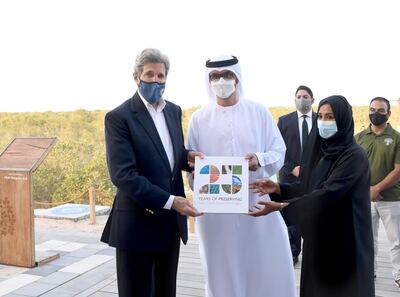On Sunday, at Abu Dhabi's Regional Climate Dialogue, the US, UK and various countries from the Middle East pledged to do everything possible to achieve the legally binding goals of the 2015 Paris Agreement. US Special Presidential Envoy for Climate John Kerry said the capital's meeting was "raising ambition". A vast amount will be needed if the international community is to reverse greenhouse gas emissions and limit the rise of global temperatures.
The Paris Agreement, which was signed by 196 parties in December 2015, promotes "zero-carbon solutions" and has spurred countries and companies into setting carbon neutral targets. But the accord has courted controversy as well as praise. Former US president Donald Trump withdrew his nation from it in 2020. The absence of the world's most powerful state was a major blow to the agreement's ambitions. US President Joe Biden reversed this decision, issuing an executive order to rejoin just hours after his inauguration.
Signatories of the Paris Agreement are preparing for November's Cop26 summit in Glasgow, where leading figures and states will co-ordinate to tackle climate change. The world has been busy with its response to Covid-19, but climate action cannot wait. Only determination and genuine commitment will generate results.

Hence the importance of meetings such as the one in Abu Dhabi, which built momentum among Middle Eastern partners in the company of high-level international representation from Mr Kerry and Alok Sharma, the UK climate envoy overseeing Cop26 preparations. The region has much to contribute to the issue. Action from the UAE sets an example for all. In an interview published today by The National, Mr Kerry praised projects such as Noor solar park in Abu Dhabi, the largest facility of its kind globally, with more than three million panels. Mr Sharma said the meeting in Abu Dhabi let the UK "work with partners across the Middle East and North Africa to accelerate climate action, vital on the road to Cop26". The Middle East at large has good reasons to act. It is an early front in the war against climate change, facing increasing water scarcity and political instability that threatens the well-being of the natural environment and therefore the livelihoods of citizens.
The Middle East's voice will also be important in dealing with a major challenge for signatories: how to devise an effective strategy for the entire global community. The region's wealthier nations have a record of supporting poorer ones, a recent example being the significance of Covax, a coalition to promote the equitable spread of Covid-19 vaccines. Governments such as the UAE's are central financial and logistical partners in the scheme. After Abu Dhabi, Mr Kerry will visit India and Bangladesh to discuss the climate crisis, a welcome sign that the US too is considering the specific needs of the broader international community in the run up to Cop26.
Abu Dhabi's meeting built momentum behind an issue that for too long has taken a back seat internationally. With ambition, the world does not have to surrender to environmental catastrophe. Hesitation is irresponsible. As Francesco La Camera, director general of the International Renewable Energy Agency, told The National after the capital's conference: "there is no vaccine for climate change".






